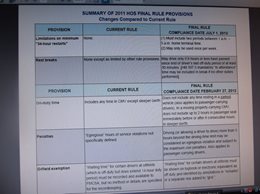Should Owner Operators Welcome Reduced HOS?

Truck drivers are a hard working bunch. That raises a question. Are we working too hard for our own good? The new changes in the hours of service will cut our production. Drivers are complaining about having to take a 30 minute break before exceeding 8 hours of driving. We aren’t happy about only being able to work 70 hours a week-with no overtime. Industry organizations are complaining that profits will be lost.
Are they wrong?
It was low freight rates that put many owner operators out of business in the last decade. The smartest and best positioned owner operators survived. We lost many good owner operators and even some fleet due to the low freight rates. A dip in freight tonnage gave shippers the upper hand in dictating rates. Companies were trapped between rising fuel costs and the low freight rates. Shippers while paying fuel surcharges did not want their overall freight rates to rise. So, as they paid higher fuel surcharges the actual freight rates went down. That put trucking companies in a bind so much so, that the company that I was leased on with had to close its doors.
The two biggest economic factors in rates are supply and demand. We saw what a drop in demand did for

freight rates. It hurt.
Man, it hurt. Now, the government wants to lessen the supply of available truck miles. If you lessen the supply, rates, will rise, all else being equal. And we are complaining about it. Maybe we should take a step back and look at the longer view.
The trucking industry is made up of many companies. No one company can control freight rates for the entire industry. If shippers could control rates, they would want to lower them. So, the only true ways to raise freight rates are to raise demand through the increased tonnage that comes with an economic boom or to decrease supply. That could get done by either lowering the total supply of drivers, or by reducing the potential production of individual drivers. Remember that when OPEC wants to raise oil prices they reduce production.
I am a big sports fan. Major League Baseball has 162 games a year. The NFL has 16. The NFL is gaining popularity, while baseball struggles to maintain. Even within MLB look at the Red Sox and the Cubs. They have small venues. Tickets are harder to come by and that makes ticket prices higher. The new ball parks average about 42,000 seats. Take for instance the San Francisco Giants. They moved out of Candlestick Park at the end of the 1999 season. At the time its capacity for baseball was 58,000. They moved into Pac Bell park for the 2000 season. Seating Capacity is just under 42,000. They sell 99.3% of the seats and have among the highest average ticket price. They have increased ticket revenue after reducing capacity by over 25%.
Major League Baseball decreased the size of stadiums and increased revenue.
While it is our natural inclination as an industry to maximize productivity, we may be lowering our rates by doing that. Through the next rounds of HOS changes the government is reducing the supply of available driver miles. Instead of fighting against them, maybe we should sit back and think 2 or 3 steps ahead.
The FMCSA just might be handing us a freight rate increase.